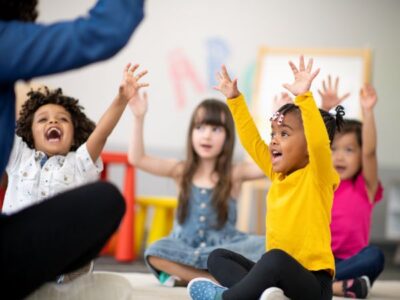Reflections on journey from providing in-home child care to running 2 child care centers

Twenty-five years ago, Karen DeVos came home to find a woman crying on her front steps.
“Open a daycare,” the woman pleaded.
“I looked at her and said, ‘Okay, why not?’ and so I did.”
Karen immediately submitted her notice at the Fargo child care center she had been working at and set out to be licensed as family child care provider.
Karen hasn’t looked back since, much to the appreciation of countless families in the communities of Ada and Halstad.
Today, she operates two child care centers – the Little Learners sites in Ada and Halstad, both featuring complementary relationships with their attached senior living facility. The children and adults all benefit from one another, whether they be playing cards together, engaging in a fame of flyswatter volleyball, gardening, or creating art and crafts.
“It’s amazing to have those interactions,” Karen said. “The ability for the kids to have these extra grandparents and really cool, unique experiences is great, and they’re able to see themselves as a bigger part of the world, of the community.”

From in-home care to opening her first center
For Karen, child care wasn’t top of mind when she entered college. She was interested in education, maybe even theater arts. But she took a part-time job at a child care center in Fargo and moved up quickly, supervising an infant house within three months.
After she and her husband, Neal, purchased their home in Ada, Karen soon tired of the commute to Fargo, so the prospect of becoming a licensed family child care provider was not unwelcome.
She opened her in-home business in 1998 and closed its doors on Dec. 31, 2013 – only to open the doors to the first Little Learners site three days later, on Jan. 2, 2014.
With three growing children, the transition toward operating a child care center allowed Karen to better balance activities and priorities.
“We were venturing into a stage of things that I could no longer be a part of because (my children) were getting busier and I needed to be home with (other) kids,” she explained. “I knew that we needed to change.”
Meanwhile, the management team at Benedictine Living Community was planning an addition for their campus that would include a learning center. They asked Karen to consider submitting a bid.
“It was terrifying but it made sense,” she said. “Because I needed to be home more. I needed to have that ability to be more involved in my children’s lives again, as they were getting older.”
The transition also allowed her to serve more families.
- As an in-home provider, she could care for up to 14 children, including two infants, with an after-school helper.
- The center allows for the care of 39 children, including four infants.
But while the change was beneficial on many fronts, operating a center did provide new challenges.
“It took me a long time to feel calm, to feel confident in my decision-making,” Karen said. “When it came to the kids and the families – that never changed for me – I lead by putting them first, always. But I didn’t know how to lead in putting my staff first, who’s more important. It took me a really long time to learn that.”

Expanding into Halstad
Karen was first approached about a potential expansion into Halstad in late 2018, when Little Learners was on the cusp of its fourth birthday.
“I laughed and said no,” she said, “and then in ’19 we revisited it again and I said, ‘You know what, yeah, I think this is an option.’”
Halstad Living Center was trying to find a solution for its workforce struggles. They had employees unable to find child care, resulting in staffing instabilities.
Karen could see that herself, albeit from a different perspective.
“At that point, I had people driving from Halstad to Ada for child care,” she said. “We were serving seven or nine communities that were coming to Ada.”
The pandemic initially delayed the opening of the Halstad site as the senior living center need to reclaim that wing to serve as its isolation area. But Little Learners West ultimately opened in January 2022, providing care for up to 50 children, including eight infants.
“Some days I feel like we’ve got it all figured out; most days, I don’t,” Karen said.

A personal drive
When asked what brings her joy in her work, Karen simultaneously brightened and turned serious.
“My greatest pull to this work is helping families who wouldn’t otherwise have opportunities like this,” she said, “connecting the kids who maybe fall through the cracks, who are growing up in families that the community isn’t always super accepting of, bringing them in and leveling the playing field.”
An Ada native herself, Karen grew up in a family that lacked privilege and it didn’t go unnoticed how defined differences were between herself and her peers.
“If we can build relationships at 3 years old, maybe they’ll have a chance to be accepted at public school,” she reasoned. “It doesn’t go unnoticed when every 4- and 5-year-old girl gets invited to a birthday party except for one.”
Now, her days are filled watching young children play and interact with each other, despite any differences.
“When I see those moments happen, that’s what brings me joy,” she said.
It’s why, when given the choice between accepting a new child that is on assistance versus a child that is not, she will always choose the first.
“Every single time,” she said. “We’re one of the few of the area that can accept scholarships.”
A changing industry
Two years ago, Karen testified in a state Senate hearing, speaking to how hard she and her family worked to build their business but, yet, she did not want her own children to take it over.
“But, now, I feel like we are changing, that the field is changing,” she said, reflecting back on the last couple of years. “I feel more positive than I did two years ago.”
Between the pandemic and workforce shortages challenging all sectors, Karen said she believes that politicians – and the general public – are more aware of the need for quality child care.
“It’s vital for the infrastructure of the community,” she said.
How NMF helped
In Halstad, the community had been facing a loss of child care providers due to retirements or changing careers.
There was a desperate need for a consistent child care program; the community worried that young families would move to larger communities because they were unable to find local child care.
NMF was originally contacted by the Halstad Living Center in 2019 with the hope of establishing a child care center in their west wing. By allocating funds through two NMF programs – Child Care and Communities Thrive – NMF was able to provide grant dollars to support the effort.
“Young children, families, and the elders of the community of Halstad and the surrounding area benefit from this child care center,” said Missy Okeson, NMF Program Officer in the Child Care program. “Young children are in a great learning environment that includes a multi-age, open program. Young families are able to bring their children to a quality program and go to work, knowing that their children are well cared for and learning.”





